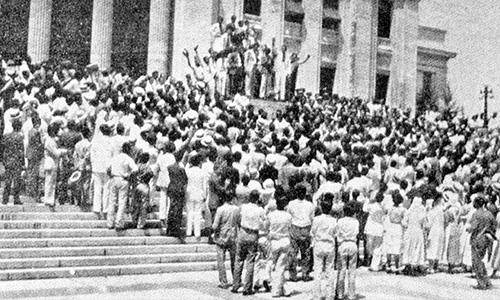 On January 18, 1934, Colonel Carlos Mendieta, a distinguished veteran of the War of Independence (1895-1898) became Cuba’s provisional president. In the turbulent and confused political period that followed the fall of Gerardo Machado (August 1933), Mendieta was succeeding Carlos Hevia, who was President of Cuba from 5 p.m. on Monday, January 15, 1934, to 1:20 a.m. on Thursday, January 18, 1934.
On January 18, 1934, Colonel Carlos Mendieta, a distinguished veteran of the War of Independence (1895-1898) became Cuba’s provisional president. In the turbulent and confused political period that followed the fall of Gerardo Machado (August 1933), Mendieta was succeeding Carlos Hevia, who was President of Cuba from 5 p.m. on Monday, January 15, 1934, to 1:20 a.m. on Thursday, January 18, 1934.
Hevia was briefly replaced, for a few hours, by Carlos Marquez Sterling until the militaries led by Colonel Fulgencio Batista with the full support of the U.S. ambassador, decided to appoint Colonel Mendita. It had taken three days and tree provisional Presidents to replace the Grau-Guiteras 100 days social-democrat provisional government that by the end of 1933 was falling apart.
Grau had been aware of the growing opposition led by Colonel Mendieta; the U.S. Ambassador, the communists and the revolutionary gangs roaming the street. To complicate matters the Cuban economy remained caught in the grips of the devastating worldwide depression and Batista shifted loyalties in an attempt to enhance his power.
Since the fall of Machado and the brief provisional presidency of Cespedes, the U.S. had refused to recognize the “de facto” government of Grau. Colonel Batista support was fading as the officers of the new army, where looking more into their place in Cuba’s political future rather than falling with the Grau-Guiteras social democratic Revolution of 1933.
Batista and his allies began searching for a suitable presidential alternative, agreeable to Washington. In January 13, Batista met Grau and told him bluntly that the U.S. had refused to grant recognition to his government and that Colonel Mendieta could lead a new government with Washington recognition.
Soon thereafter, Grau went into exile and on January 18, the war veteran, Colonel Mendieta was appointed and became Batista’s surrogate president. On January 23, Washington extended a “formal and cordial recognition” to the new Cuban government. Like a recurrent malady the Cuban army was in control. The guns of the battleship “Wyoming” anchored at Havana’s harbor joyfully saluted the new government. The Grau revolution was over but despite the appearance of normalcy Cuba’s social and economic fabric had changed forever.








